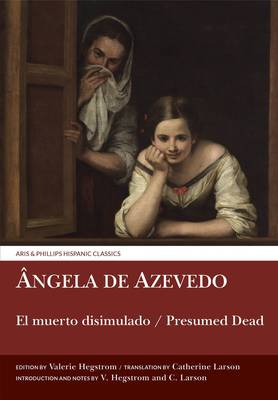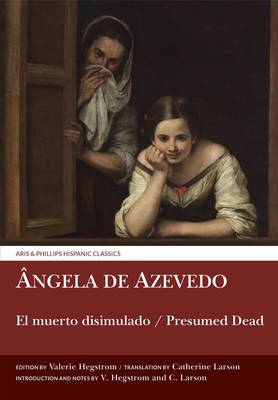
- Retrait gratuit dans votre magasin Club
- 7.000.000 titres dans notre catalogue
- Payer en toute sécurité
- Toujours un magasin près de chez vous
- Retrait gratuit dans votre magasin Club
- 7.000.0000 titres dans notre catalogue
- Payer en toute sécurité
- Toujours un magasin près de chez vous
93,45 €
+ 186 points
Format
Description
The Society for the Study of Early Modern Women and Gender awarded this work the Prize for the Best Translated Edition of a Work on Women and Gender, 2018.
Valerie Hegstrom and Catherine Larson have created an annotated new edition and first-ever translation of Ângela de Azevedo's vibrant comedy, El muerto disimulado / Presumed Dead, to promote the recuperation of early modern plays authored by women. The book contains a comprehensive introduction that describes Spanish theater in its Golden Age, what is known of the author's life and times, contemporary stagings, and an extensive analysis of the text. Although the playwright penned her work in Spanish, the Portuguese Azevedo set the action in Lisbon, creating in the process an abundance of multicultural allusions that enrich the text's baroque quality. The story unfolds as a cross between a jilted-lover scenario and a whodunit murder mystery. A woman laments her departed lover, a sister cross-dresses to avenge her murdered brother, a man duels with his cousin over lost honor, and before long, the dead man turns up as a ghost, or a bar maid, or a female peddler. Questions about identity abound in the witty El muerto disimulado / Presumed Dead. The transnational nature of this clever comedy complicates meanings, often producing bilingual wordplay that underscores the self-conscious, gender-bending, ludic character of the play and of theater in general. Azevedo highlights her ability to cross linguistic and geographic borders in the early modern period, as she simultaneously works within and offers a challenge to the dominant tradition of the Spanish Comedia.Spécifications
Parties prenantes
- Auteur(s) :
- Traducteur(s):
- Editeur:
Contenu
- Nombre de pages :
- 336
- Langue:
- Anglais
- Collection :
Caractéristiques
- EAN:
- 9781786940728
- Date de parution :
- 25-01-18
- Format:
- Livre broché
- Format numérique:
- Trade paperback (VS)
- Dimensions :
- 147 mm x 211 mm
- Poids :
- 439 g

Les avis
Nous publions uniquement les avis qui respectent les conditions requises. Consultez nos conditions pour les avis.






